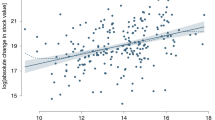Abstract
Lobbying is considered to be an important factor in the success or failure of climate change legislation. This paper provides an estimate of lobbying expenditures related to climate change legislation in the U.S. Congress from 2000 to 2016. During this time period, over $2 billion was spent on this activity, constituting 3.9% of total lobbying expenditures. Major sectors involved in lobbying were fossil fuel and transportation corporations, utilities, and affiliated trade associations. Expenditures by these sectors dwarf those of environmental organizations and renewable energy corporations. Levels of expenditures on lobbying appear to be related to the introduction and probability of passage of significant climate legislation. Future research should focus on tying particular positions on climate legislation and lobbying expenditures at the corporate level.






Similar content being viewed by others
References
Baumgartner F, Leech B (1998) Basic interests: the importance of groups in politics and in political science. Princeton University Press, Princeton
Baumgartner F, Berry J, Hojnacki M, Leech B, Kimball D (2009) Lobbying and policy change: who wins, who loses, and why. University of Chicago Press, Chicago
Brulle RJ (2014) Institutionalizing delay: foundation funding and the creation of US climate change counter-movement organizations. Clim Chang 122:681–694
Brulle R, Dunlap R (2015) Sociology and climate change introduction: pp. 1–31 in Dunlap, Riley, Brulle, Robert J., (eds.) Climate change and society: sociological perspectives. Oxford Press: New York
Brulle RJ, Carmichael J, Jenkins JC (2012) Shifting public opinion on climate change: an empirical assessment of factors influencing concern over climate change in the US, 2002–2010. Clim Chang 114(2):169–188
Burstein P (2010) Public opinion, public policy, and democracy. In: Leicht K, Jenkins J (eds) Handbook of politics: state and society in global perspective. Springer, New York, pp 63–79
Cook KS, Whitmeyer JM (1992) Two approaches to social structure: exchange theory and network analysis. Annu Rev Sociol 18:109–127
De Figueiredo JM, Richter BK (2014) Advancing the empirical research on lobbying. Annual Review of Political Science. (17)163–185
Delmas M, Lim J, Nairn-Birch N (2016) Corporate environmental performance and lobbying. Academy of Management Discoveries 2(2):175–197
Downie C (2017) Business actors, political resistance, and strategies for policymakers. Energy Policy 108:583–592
Drutman L (2015) The business of America is lobbying. Oxford University Press, New York
Edwards L (2016) The role of public relations in deliberative systems. J Commun 66:60–81
Farrell J (2016) Corporate funding and ideological polarization about climate change. Proc Natl Acad Sci 113(1):92–97
Fuchs S (2001) Against essentialism: a theory of culture and society. Harvard University Press, Cambridge
Grossmann M (2014) Artists of the possible. Oxford University Press, New York
Grumbach JM (2015) Polluting industries as climate protagonists: cap and trade and the problem of business preferences. Business and Politics 17(4):633–659
Gulati R, Gargiulo M (1999) Where do interorganizational networks come from? Am J Sociol 104(5):1439–1493
Kim S, Urpelainen J, Yang J (2016) Electric utilities and American climate policy: lobbying by expected winners and losers. Journal of Public Policy 36(2):251–275
Knoke D (1990) Political networks: the structural perspective. Cambridge University Press, Cambridge
Knoke D, Yang S (2008) Social network analysis (Vol. 154). Sage
LaPira TM, Thomas HF (2014) Revolving door lobbyists and interest representation. Interest Groups & Advocacy. 3(1):4–29
Laumann EO, Knoke D (1987) The organizational state: social choice in national policy domains. Univ of Wisconsin Press, Madison
McGarity TO (2014) The disruptive politics of climate disruption. Nova Law Review 38(3):3
Milbrath L (1963) The Washington lobbyists. Rand McNally, Chicago
Podolny JM, Page KL (1998) Network forms of organization. Annu Rev Sociol 24:57–76
Shove E (2010) Beyond the ABC: climate change policy and theories of social change. Environ Plan A 42:1273–1285
Somerville I, Ramsey P (2012) Public relations and politics. In: Theaker A (ed) The public relations handbook, 4th edn. Routledge, New York, pp 38–59
Author information
Authors and Affiliations
Corresponding author
Electronic supplementary material
ESM 1
(DOCX 26 kb)
Rights and permissions
About this article
Cite this article
Brulle, R.J. The climate lobby: a sectoral analysis of lobbying spending on climate change in the USA, 2000 to 2016. Climatic Change 149, 289–303 (2018). https://doi.org/10.1007/s10584-018-2241-z
Received:
Accepted:
Published:
Issue Date:
DOI: https://doi.org/10.1007/s10584-018-2241-z



